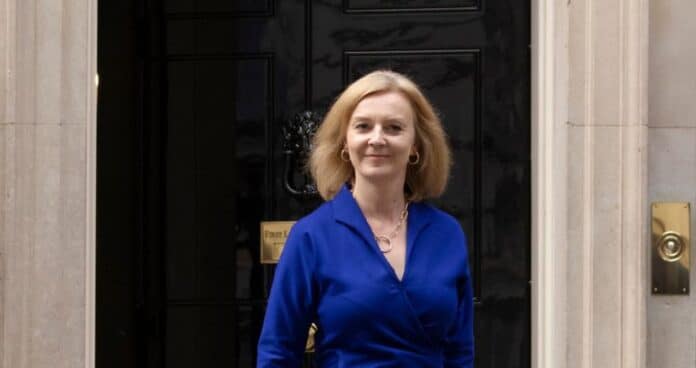The current foreign secretary of the UK, Liz Truss, is the favourite candidate to replace Boris Johnson as the next Prime Minister. Truss has made it into the final round of Tory Leadership against her former cabinet colleague Rishi Sunak. However, the battle is far from over, given the Tory voting system. Both candidates still have to compete in more TV debates answering questions about thier policies. Nearly 160,000 conservative party members will vote for their pick before the final results come out on September 5.
Who is Liz Truss?
Liz Truss was born in Oxford to John Kenneth and Priscilla Truss Mary. Her father was a maths professor, and her mother was a nurse, a teacher, and an active member of the Nuclear Disarmament campaign. Before starting her political career, Truss worked as a commercial manager for petroleum giant Shell as a commercial manager and as an economics director for Cable & Wireless.
She was not always a Tory. In her beginning days, she was the President of Liberal Democrats of Oxford University and also a national executive member of its Youth wing. However, her political views changed after graduation, and she joined the conservative party in 1996.
Truss, who previously described herself as the “left of Labour”, shifted to the right after believing that Tories were saying “quite sane things”. She went on to serve in several cabinet positions under the leadership of David Cameron, Theresa May, and Boris Johnson. She has served as the Foreign minister since 2021 and the Women and Equalities minister since 2019.
Following the fiery debate sessions between Truss and Sunak, a survey has found that the foreign secretary performed better than the former Chief Secretary to the Treasury.
Policies and Promises
Although from the same party, Liz Truss has planned a different set of policies than her counterpart Rishi Sunak. However, both have failed to earn the trust of the masses, as seen from the reaction on social media. During the debate, candidates discussed important policy areas, including economy, education, climate, NHS, immigration and Rwanda removal scheme, strikes, Brexit, and Scotland.
Truss has hinted at a series of tax cuts. She is keen on reversing the rising national insurance rate designed to fund social and health care. The tax cuts proposed by Truss would reportedly sum up to 35 billion GBP. Critics said Truss’s tax cuts could force the Bank of England to raise the interest rate above 7%. Her policies resulted in vicious criticism on social media, with many calling her a “dangerous” person to lead the UK under inflation. She believes this inflation in the UK is “cost-pushed”, which happens when the supply of goods and services is low. This type of inflation pushes up the prices due to an increase in the cost of production. UK’s inflation is mainly fueled by supply chain disruption caused by the demand boom in the COVID-19 pandemic.
During a decisive battle with the deadly virus, the world was not ready for another one in Ukraine. Russia’s attack on its neighbour has driven up oil prices across the world, also adding to the UK’s misery. Many criticised Truss for unfair politics when a more realistic social care could have cost much less.
Still A Tory
Liz Truss is also criticised for the handling of education and climate change. She promised to provide the “same opportunities” for everyone in every town. She mentioned her own school for reference, but critics quickly highlighted how the schools have always been under the Tory government. Many of them trolled both candidates as the problems they mentioned existed under thier own party’s governance. Some felt that Truss probably said too much.
Unfortunately, the climate issue is the least of all the concerns of both Tory candidates. Truss has also been an Environment Secretary and a somewhat controversial one. She had cut the subsidy to solar farms, claiming they hinder food production. She also suggested halting funds for green energy initiatives to increase gas extraction in North Sea fields. Those who supported Truss kept pointing to the deals she made while she was a trade secretary. Truss negotiated a post-Brexit free trade agreement with Japan in 2020, making 99% of exports to Japan tariff-free. It was the first major trade deal for the UK after leaving the European Union. Previously, she opposed the idea of Brexit, saying that she didn’t want her kids to require Visa while travelling to Europe. However, after 2017, she admitted that she was wrong and that were many opportunities after Brexit. The leading candidate to replace Boris Johnson has pledged to drop all EU laws in the UK by 2023 should she become the next PM.


